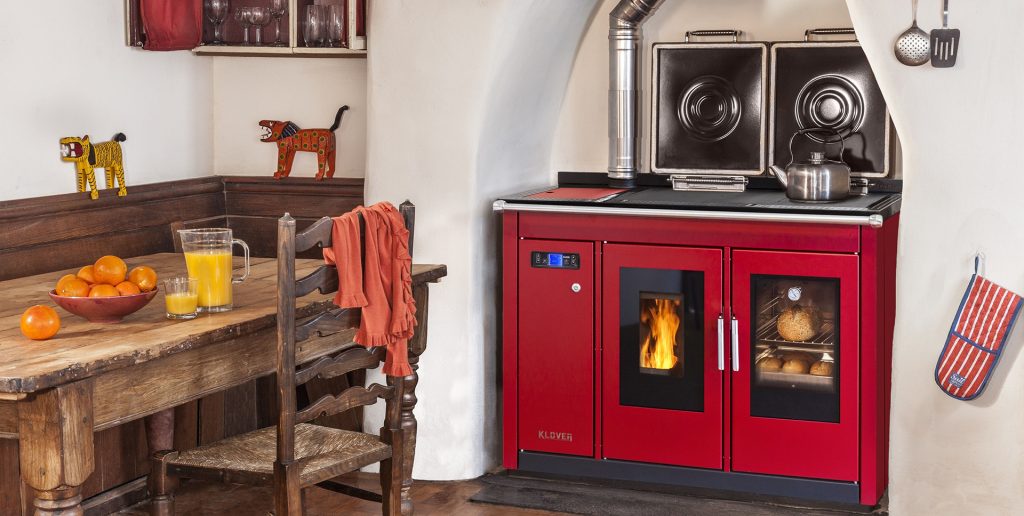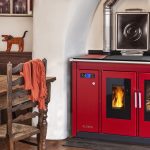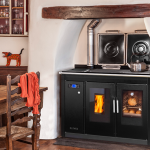
When considering options for renewable heating, a biomass boiler should not be ignored. With various models suitable for various fuel types and different applications, Biomass boilers can meet the renewable heating needs of just about any home or integrated renewable heating system. As with other renewable technology, domestic biomass boilers have come on leaps and bounds in recent years!
Despite their fantastic reputation, there can be some confusion around biomass boilers, especially with questions around whether they are a viable option to heat the home. To dispel some myths and uncertainty around Biomass boilers we have created the below article which looks into exactly how a biomass boiler works, it’s efficiency and its suitability for you and your requirements. Discover more about Biomass boilers below…
What Is a Biomass Boiler?
To talk about biomass boilers, we should first clarify what ‘Biomass’ means. ‘Biomass’ is fuel that is obtained from organic matter, the most widely used of which is wood. So, a biomass boiler is a heating system that uses natural/non-fossil fuel resources to create heat for use throughout your home or premises. �
This renewable heating system is available in a few variations, with capabilities and prices varying between each type. The main types that are frequently used, and that we will cover, are wood pellet boilers, wood chip boilers, and wood log boilers. These are your best options when it comes to a domestic or commercial biomass boiler, primarily due to their heat production and the availability of the fuel they use.
Simply put, biomass boilers are an environmentally friendly and sustainable rival to the standard gas or oil boilers used in homes. They are versatile, affordable, long lasting, and importantly, they are future proof. In this modern world, a focus on renewable heating and energy, along with sustainability in general, is essential.
How Do Biomass Boilers Work?
One of the biggest selling points of a Biomass boiler is their ease of use and sense of simplicity. You really are going back to basics burning a sustainable/renewable fuel in order to generate heat and energy. This renewable heating system works much like the existing boiler in your home, making the switch from traditional fossil fuel heating to a greener solution much easier.
These eco-friendly boilers utilise wood, wood chips, pellets, or logs. With these examples of fuel, we can go into some detail on how Biomass boilers work.
Biomass heating works by burning the natural fuel that is intended for your specific system, whether that be wood pellets, logs or wood chips, creating heat that can be utilised as part of a heating system or for one localised area. For the boiler to continue operating it will need to be fed fuel, this can be automated or done manually depending on your preference and budget. Your biomass heating system will require little maintenance to function, however the ash that is built up from burning fuel will need to be removed every once in a while, and regular biomass boiler servicing or maintenance wouldn’t be a bad idea.
What Fuel Does a Biomass Boiler Use?
We have briefly covered the fuel that is used for biomass heating already, but there are more details that will help you decide on which is best for you and your requirements. It is important to think about which biomass boiler fuel will work well for your home, as well as the logistics of sourcing your fuel on a regular basis. Let’s take a look at the main types of biomass fuel below:
- Wood Chips:Wood chips are small pieces of wood which have been taken from logs and other general wood waste. the sizes of wood chips will vary. Wood chips are reasonably cheap and readily available but not always as efficient as their pellet counterpart. Wood chips are suited more for heating larger buildings. You can use wood chips, as well as pellets, in an automated system that uses a hopper to feed the boiler.
- Wood Pellets:Made from compacted sawdust, woodwork/forestry waste or wood shavings, wood pellets are the most frequently used fuel for domestic biomass boilers. They are designed well to suit the automated hopper system and are often sold in large quantities, so that you can stock up for continued usage. Wood pellets take up little room but provide great efficiency. Wood pellets are the most consistent and reliable fuel option, with low moisture content and standardised sizes creating an easy-to-use experience.
- Wood Logs:Logs are possibly the least common choice for biomass boilers these days. Using wood logs is a valid option but requires the fuel to be fed by hand. Buying logs can be cheap, however the number of logs required in order to reach satisfactory heat levels can be high. It is recommended that those with a larger property with more suitable storage space go for this option, as well as those looking for more control over the fuel input.
Each of these fuel types can be used in biomass boilers, whether you choose a wood pellet boiler, a wood chip boiler, or a wood log boiler for your requirements. All are fantastic sources of renewable heat, and the use of a sustainable source of fuel can give you peace of mind knowing that you are helping to reduce your environmental impact.
It important to remember that you will need space to store the fuel no matter what installation you go for. This shouldn’t be too much of an issue with wood pellets, however it is still essential that the correct planning takes place before finalising a decision.
Which Type of Biomass Boiler Should You Install?
When installing a biomass boiler, the tradesperson carrying out the task will advise you on which boiler will work best for your home and requirements, for example a pellet boiler will be ideal for an urban home, but larger properties might benefit from having a larger or more complex system installed. There are advantages and disadvantages between each Biomass system, so it is difficult to have a definitive answer on which renewable heating system is best.
When it comes to the average biomass boiler, you are sure to want something which isn’t too dissimilar from your existing system, this will make the change practically non-noticeable. To achieve this desired outcome, there are a few factors that will need to be considered:
- Size:Wood chip boilers will often take up the most room, they are suitable if you have a sizeable property and space to install. However, a pellet boiler will occupy less space due to its smaller size yet will still be able to heat a room just as effectively. If you are looking to install a renewable heating system in your home, then you will probably be looking for an averagely sized biomass boiler that won’t feel cramped in the space available; unfortunately these systems are typically larger than their gas and oil alternatives. However, this size difference isn’t always much, and certainly doesn’t rule out an installation, especially with the development of wood pellet boilers becoming viable heating systems in modern properties.
- Cost:Speaking generally, the costs of installing a Biomass boiler will range from around £8,000 to £15,000. That being said, it can be cheaper for a domestic Biomass boiler, starting around £4,000/£5,000 and being variably higher depending on the amount of heating needed for a home and the type of boiler used. Automatic and semi-automatic fed boilers will typically cost more than manually fed versions such as a log boiler, but usually this price increase is worth it for ease of use. The costs of running a biomass boiler will be centred around the fuel type you use, as maintenance isn’t usually a big factor here. The most expensive fuel is wood pellets at around £200+ per tonne, second is logs at around £100 per tonne, and wood chips at about £50+ per tonne. Buying bulk pellets is most cost effective and will also allow for quality heating and compared to the running costs of a traditional boiler, the biomass option wins easily. It is also worth taking into consideration that you can recover some of your up-front expenses through the RHI Scheme, earning you money back through your continues use of a renewable heating systems.
- Efficiency:This is where biomass heating really excels! You can expect an efficiency of around 80% and above, often more efficient than a standard gas boiler! The efficiency of an installed boiler will, to some extent, be affected by existing heat flow and insulation in your home, it will also be affected a little by size of the space to be heated. For best efficiency the use of pellets and logs is recommended, these will yield the most efficient heating.
Want To Find Out More About The Renewable Heat Incentive? Read Our Complete Guide To The Renewable Heat Incentive Today…
Should I Use a Biomass Boiler on Its Own?
Of course, it is entirely up to you how you implement any heating system into your home or business, but there are certain integrated systems that will help you to make the most out of your installation. Biomass boilers are undeniably one of the most approachable renewable heating systems and can provide reliable heating all year round. Its valuable to clarify which possible uses of this system will keep up with your heat demands.
- As Part Of An Integrated/Hybrid Heating System:A sure-fire way for powerful heating is to implement an integrated or hybrid heating system. We have covered this option in another post in detail here, but we will provide an overview here too. An integrated heating system allows for the use of a traditional boiler alongside a renewable source, this can create a synergy for the greatest heating possible. The traditional heating can act as a backup if the renewable source is perhaps underperforming, switching between them for optimal heating. Biomass boilers are not frequently used this way, but if it is possible on your property then it’s an excellent idea. �
- With Another Renewable Heating System: This is an impressive way to go fossil fuel free. Though a rare choice, you can have a boiler working with a system such as an air-source heat pump to have fully renewable sources of heating around your home. As with an integrated heating system, the dual system will make use of both sources, switching between whichever be most useful.
- As A Standalone Heating System:A huge advantage of biomass boilers is the fact that they are incredibly useful on their own. They can create enough heat all year round, without any real heat fall off in winter, which when compared to other renewable heating systems, is a big win. It is a possibility in many cases for this system to completely replace the conventional system you have in place; through this replacement you will have sufficient heating, lower environmental impact, and be earning money back through the RHI.
It’s difficult to argue against biomass boilers, they are one of the leading renewable heating systems that have emerged in recent years. There are many benefits such as carbon neutral heating and cheaper running costs compared to standard boilers, and only a few possible drawbacks such as obtaining fuel and minor maintenance. If you are considering a change to renewable heating, then a biomass boiler is a good way to go. If you require further information then our specialists can provide free on-site surveys to evaluate what would work best for you.
If you have any questions about biomass boilers or if you would like to enquire about getting a biomass boiler installed in your home, then please contact us here at A Greener Alternative today. We can answer any questions you may have as well as help you to decide on what the best renewable heating system will be for your requirements. We offer free onsite surveys and can provide our expertise on renewable heating all across the South East of England. You can get in touch with A Greener Alternative by using our Contact Form, by emailing us at: info@agreeneralternative.co.uk or by calling us on: 01273 455695. Discover more about A Greener Alternative and what makes us a leading installer of Biomass Boilers in Sussex and The South East today…

















